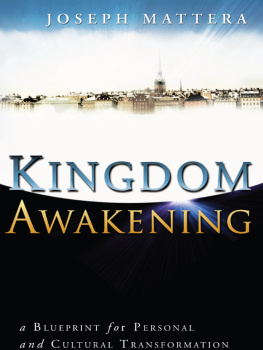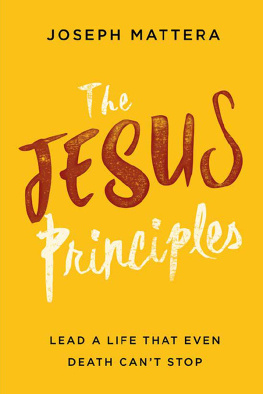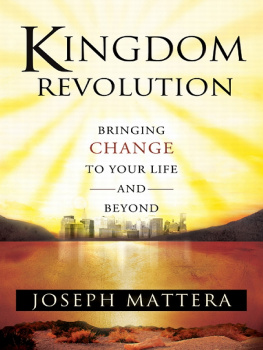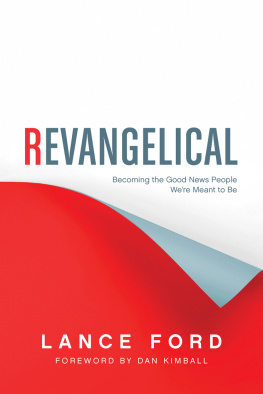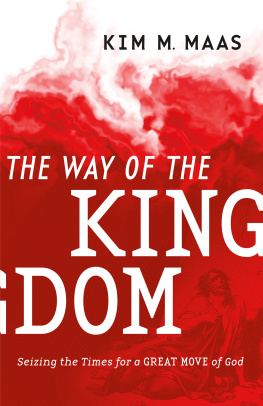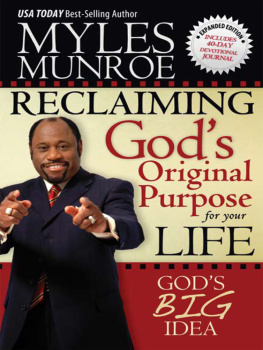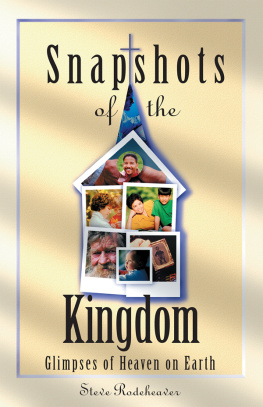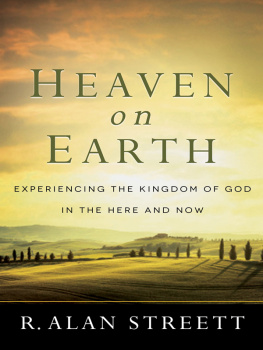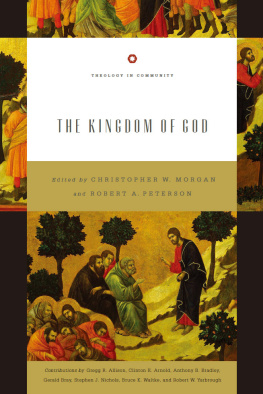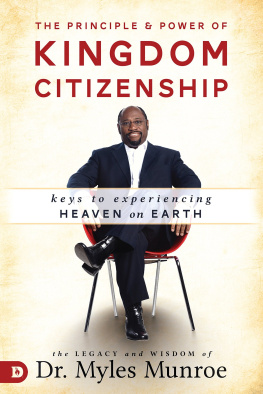About Joseph Mattera
Joseph Mattera is the overseeing bishop of Resurrection Church in Brooklyn, New York, a multi-ethnic congregation of 40 nationalities. He is also the presiding bishop of Christ Covenant Coalition. He is the author of Kingdom Revolution and Ruling in the Gates, and has a Web site for Christian leaders at www.josephmattera.org.
www.josephmattera.org
Other Books by Joseph Mattera
Ruling in the Gates (Lake Mary, FL: Creation House, 2003)
Kingdom Revolution (Shippensburg, PA: Destiny Image, 2009)

A lthough the following themes were borrowed from and Culture by Richard Niebuhr, the content of this chapter is based on my personal observations, which may or may not be reflected in his book. These observations are not meant to offend any person or group but are generalities rather than stereotypes. My purpose in explaining these five differing models of the Kingdom is to clarify viewpoints so that we can focus on the areas where we can agree, and overlook the areas where our philosophies differ, so we can truly partner together for the advancement of the Kingdom.
A quick summary of the five models is as follows:
- Christ Against Culture: The church is separate from and speaking against secular culture rather than trying to transform it.
- Christ of Culture: The church accommodates Christ and Christianity to culture.
- Christ Above Culture: Christ is Lord above all culture, and the church strives to bring all creation into submission to God.
- Christ Transforming Culture: The church functions as salt and light in every realm of society. Those espousing this view believe that they will never completely change the political and economic systems on this side of Heaven, but that they are called to influence each realm as a witness of Christs Gospel.
- Christ and Culture in Paradox: There are always two kingdoms existing in the world simultaneouslythe Kingdom of God and the kingdoms of this world. The two will never mesh together completely but are to function concurrently until the end of time when Christ comes back to judge the world. Some believe this was the viewpoint of Augustine, Luther, and St. Paul.
We will look at each one in more depth so that we will have a better understanding of the various viewpoints and the Body of Christs approach to culture based on each of these worldviews. I believe that by understanding both our differences and our common ground, we can more effectively partner to accomplish what God has called us to do in our cities and communities.
I believe that by understanding both our differences and our common ground, we can more effectively partner to accomplish what God has called us to do in our cities and communities.
Christ Against Culture
Although there have been both individual church leaders and Christian movements throughout history that have proposed this position, I want to focus on the more recent fundamentalist movement that began in the Evangelical church in the late 1890s and has continued on to the present day. Typically, these fundamentalists are suspicious of all secular culture and regard it as worldly. This can lead to legalism in their adherents, with such rules as abiding by a certain dress code, avoiding movies and the theater, or counting the arts as a waste of time. They dont believe the Bible speaks anything of value to such disciplines, except to condemn them for ungodliness.
As a general rule, this worldview advocates the separation of church and culture. First John 2:15, which says you cant love the world and God at the same time, and Second Corinthians 6:14-17, which warns against being yoked to unbelievers, are key verses used for substantiating this position. Adherents to this viewpoint also tend to be biblicists, which means that their primary focus is to read the Bible instead of any other books.
Along with this position, they tend to be anti-intellectual. However, this does not mean they are unintelligent. It simply means they usually dont espouse university or seminary education for their children or ministers in training. They tend to be parochial in that many organize their own forms of education, including homeschooling or private Christian schools stemming out of their local church. They usually have numerous Bible institutes, which serve as branch schools for a larger, more credible mother institute. They create institutions because they resent that accreditation is given to schools with curriculum that includes subjects like math, science, and language.
They believe in biblical inerrancy, and many in their ranks believe the King James Version is the only authenticated version of Scripture. Their ethnic demographic is mostly Caucasian, and they are mostly independent and Protestant Evangelicals. They are usually highly sectarian, which means they only fellowship with like-minded believers. They believe Evangelical fundamentalists are the sole arbiters of truth; therefore, they tend to shy away from associating with mainline Christian denominations and groups that are non-fundamental. They are anti-hierarchical in regard to recognizing any titles other than pastor in the church. They would not recognize the office of the bishop other than it being another way to describe an elder.
Theologically, they tend to be hyper-dispensational and pre-millennial, with an emphasis on the imminent return of the Lord and the rapture of the church, which is perhaps the main reason for their anti-intellectualismhigher education in liberal arts is a waste of time if the end is near. I have had much contact with this category of Christianity because I attended an independent, ultra-fundamentalist Bible institute. Only the Bible or biblical literature was encouraged to be studied, there was no interaction with culture except to go door to door to witness, women had no leadership or teaching role unless it was to other women, Pentecostal expressions of the gifts of the Spirit were discouraged, and the second coming of Christ was constantly emphasized. In spite of these shortcomings, they instilled in me a love for studying the Word that I will always cherish.
In terms of morality and culture, they tend to have a very simple approach to public policy. They advocate the need for prayer in public schools and the overturning of Roe vs. Wade. They oppose same-sex marriage, illegal immigration, and globalism associated with the United Nations and the New World Order. Most of their congregants scarcely have anything to say about policy other than the pro-life and anti-gay positions. Some of these descriptions may vary with different churches or movements, but generally they are endemic of the fundamentalist movement and have been for the past 130 years.
Critique of Christ Against Culture
I disagree with the Christ Against Culture position and do not recognize it as being fully biblical. I believe that God created the world, and thus it is not inherently evil. God as Creator cannot be separated from Jesus as redeemer and sanctifier. That is to say, Jesus not only died on the cross as our Redeemer but was also the Creator of the world. Thus, He loves and is concerned about all creation and the created order, not just spiritual things (see John 1:3).
The fundamentalist tendencies of Christ Against Culture are a mild form of Gnosticism, in which the material world is deemed evil and the spiritual world holy. Johns Gospel counters this position by beginning that the Word was involved in the creation of the universe, and that
Next page
